Top 10 Vegan Foods to Help You Gain Weight
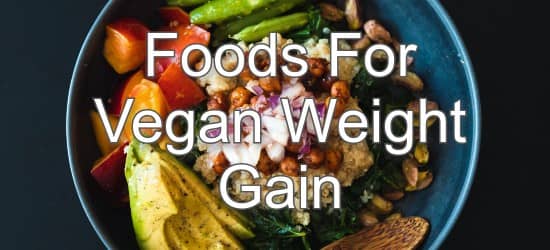
Vegan or plant-based diets are gaining in popularity as there are many potential health benefits associated with this way of eating. A plant-based diet has been found to reduce the risk of many common diseases, including obesity, heart disease, type 2 diabetes, and various types of cancer (1,2,3).
When trying to gain weight on a vegan diet, there are a couple of factors to consider. Firstly, it is necessary to increase your calorie intake, so that you consume more energy than you burn. This may be more challenging for vegans, because many vegan foods are low in calories. Secondly, you’ll need to ensure that you are eating adequate protein. In combination with some form of resistance exercise, this will help you to build muscle mass.
As a general rule, adding around an extra 500 calories per day is a good "benchmark." When you exercise, you can increase this a little more. It is important to obtain the extra calories from across the range of food groups; protein, carbohydrates, and healthy fats.
Resistance exercise is any type of exercise that causes muscles to contract against a force or resistance. This can be free weights, weight machines or your own body weight. Examples include weight lifting, pulling resistance bands, squats, lunges, push-ups, and even certain yoga poses. Resistance exercise builds and tones muscles and makes them stronger, as well as increasing bone strength.
For good cardiovascular health, it is also recommended to include 150 minutes of aerobic exercise per week, like walking, running, cycling, or swimming. However, you may need to keep this light when trying to gain weight, as aerobic exercise burns a lot of calories and may make weight gain more challenging.
Many bodybuilders and gym-goers are convinced that you need animal protein to build muscle. There are, however, many successful vegan bodybuilders and athletes. Some bodybuilders are also concerned that inflammation caused by animal proteins might actually hinder athletic performance.
If you are following a plant-based diet and want to gain weight, this article may be useful for you. It includes high-calorie vegan foods, along with high-protein vegan foods for supporting muscle building.
Foods for Vegan Weight Gain
-
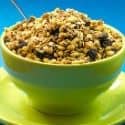 1. Homemade Granola + Add
1. Homemade Granola + Add
Calories per Cup Calories per 100g 597 calories 489 calories Granola is a high-energy food that can be very healthy if you choose store-bought products carefully or make your own. Granola makes a great high-energy snack as well as breakfast. Make or choose products made from oats, to supply energy, fiber, B vitamins, and minerals. Also add plenty of nuts, seeds, dried fruits, and shredded coconut for extra energy and nutrients. Many store-brought granola products contain unhealthy ingredients. Check the label and avoid buying granola with added refined sugars, refined grains, or unhealthy oils. -
 2. Firm Tofu + Add
2. Firm Tofu + Add
Calories per Cup Calories per 100g 363 calories 144 calories Tofu is a top vegetarian source of protein. All types of protein supply the body with the amino acid building blocks required to form new muscle, but some foods contain a better profile of amino acids than others. Tofu is one of the only plant foods containing all nine essential amino acids, which are those amino acids that must be obtained through diet, because the body cannot manufacture them. (4) -
3. Healthy Fats (Avocados) + Add
Calories per Avocado Calories per 100g 322 calories 160 calories When trying to gain weight and increase your calorie intake, it is important to include plenty of healthy fats in your diet. Gram for gram, fats have a higher calorie content than protein and carbohydrates (9 calories per gram of fat versus 4 calories per gram of protein or carbohydrate). Top vegan sources of healthy fats include avocados, hummus, coconut products, olive oil, nuts, seeds, and nut butters. -
 4. Smoothies + Add
4. Smoothies + Add
Calories in 1 Smoothie Calories per 100g 390 calories 129 calories Homemade smoothies are an excellent way to get more healthy calories, fats, and protein into your diet. They make a great snack between meals. You can add many of the aforementioned foods, such as nuts, seeds, nut butters, avocados, along with vegan protein powders, fruits, vegetables etc. In general, it�s better to make your own smoothies, and avoid store-bought, packaged smoothies. These are often highly processed and high in sugar. -
 5. Pulses (Lentils) + Add
5. Pulses (Lentils) + Add
Calories per Cup Calories per 100g 230 calories 116 calories Pulses, including beans, lentils, and chickpeas, provide a healthy dose of plant-based protein for muscle building. Pulses are also a great energy food, as they contain slow-releasing carbohydrates and fiber, which help keep blood sugar levels balanced. Combining brown rice or other whole grains with pulses helps provide a wide range of amino acids. -
 6. Quinoa + Add
6. Quinoa + Add
Calories per Cup Calories per 100g 222 calories 120 calories Quinoa is botanically a seed, but it's eaten as a grain. It is packed with protein, fiber, vitamins, minerals and antioxidants, plus all the amino acids needed for muscle growth. In fact, quinoa is the ideal grain for anyone looking to build muscle, as it is higher in protein than most other grains with a good amino acid profile(5). It is also an excellent high-energy food, containing slow-releasing carbohydrates and the minerals magnesium and iron, which are required for maintaining energy levels. -
 7. Peanut Butter + Add
7. Peanut Butter + Add
Calories 2 Tblsp Calories per 100g 188 calories 589 calories Peanuts are not technically nuts, but legumes (from the same family as beans and lentils), which accounts for their higher protein content compared with other nuts. Peanuts and peanut butter contain around 24g protein per 100g. In one study, elderly patients were given peanut protein in combination with resistance training for 6 weeks, and this led to significant increases in both muscle growth and strength. (6) -
 8. Dark Chocolate (85% Cocoa) + Add
8. Dark Chocolate (85% Cocoa) + Add
Calories per 1oz Square Calories per 100g 170 calories 598 calories Good quality dark chocolate with a high cocoa content is actually a very nutritious food and makes a great vegan, high-energy snack. It is a top dietary source of antioxidants. In particular, chocolate contains high levels of a type of antioxidant called flavonols, which have been associated with various health benefits including lowering blood pressure, improving blood flow through vessels, and improving blood sugar and fat processing. (7) -
9. Nuts and Seeds (Squash Seeds) + Add
Calories per 1oz Handful Calories per 100g 163 calories 574 calories Nuts and Seeds make a great portable snack and can be sprinkled on top of many dishes, including oatmeal, salads, soups etc. They are a nutrient and energy-dense food, containing vitamins, minerals, healthy fats, and a decent dose of plant protein. Almonds have the highest protein content of all nuts (except peanuts, which are not technically nuts, but legumes); a handful contains around 6g of protein. Eating nuts has been associated with many health benefits, including lowering cholesterol levels and reducing the risk of many diseases. (8) -
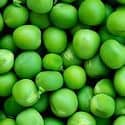 10. Green Peas + Add
10. Green Peas + Add
Calories per Cup Cooked Calories per 100g 134 calories 84 calories A cup of cooked peas contains nearly 9 grams of protein. Pea protein powder is gaining popularity as a vegan protein source. One study found that pea protein in combination with resistance training promoted a greater increase in muscle thickness after 12 weeks, compared with just training alone. The results were particularly pronounced in people starting or returning to training after a break and were comparable to a third group who took whey protein (9). See more high-protein vegetables.
Printable One Page Sheet
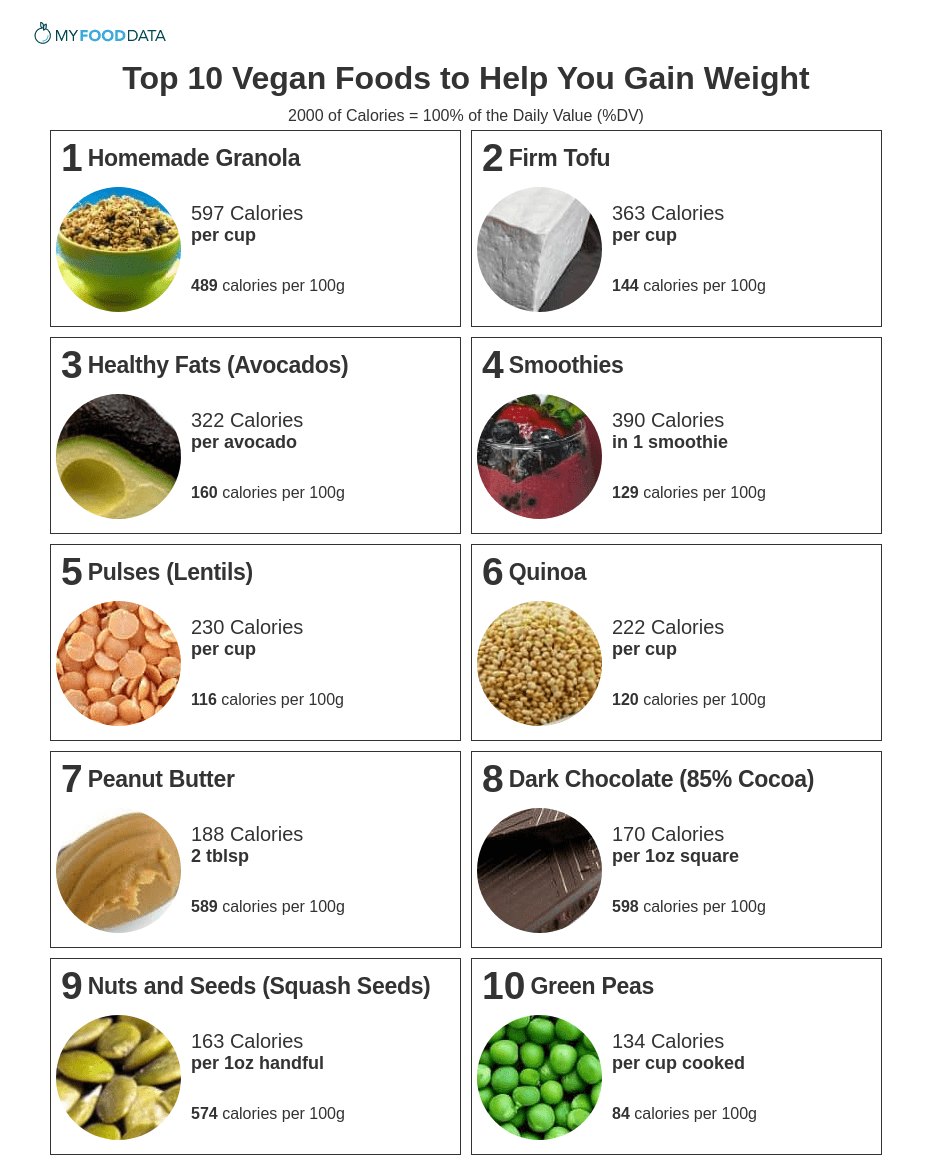
Tips For Vegan Weight Gain
- Eating many little snacks throughout the day generally helps to encourage a higher overall food intake. This means breakfast, lunch, dinner and 2-3 snacks each day. Also aim for a slight increase in portion sizes of about 25-30%.
- Regular meal times are also important for regulating appetite. Eating within a 2-hour window whenever possible is advisable. For example, you could always have breakfast between 8 and 10am, and lunch between 1 and 3 pm. The body gets used to regular mealtimes, and eventually you will feel hungry at these times, even if this doesn’t happen right away. By contrast, irregular eating patterns can disrupt appetite control, which may lead to over- or under-eating.
- When it’s not possible to stick to your usual mealtime, try to have a substantial snack, and then eat as soon as you can.
- Caffeine can suppress appetite, so it’s best either to avoid it or to drink it only after meals. Limit caffeine consumption to 1-2 coffees or black teas per day.
- As mentioned above, include resistance exercise 2-4 times per week for muscle building. You might find it beneficial to consult a personal trainer who can create a program for you to follow.
From the Nutrient Ranking Tool
Use the ranking tool links below to select foods and create your own food list to share or print.
- Foods High in Calories
- Foods Low in Calories
- Vegetables High in Calories
- Fruits High in Calories
- Vegetarian Foods High in Calories
- Nuts High in Calories
- Grains High in Calories
- Beans High in Calories
- Dairy High in Calories
- Breakfast Cereals High in Calories
- Fast Foods High in Calories
View more nutrients with the nutrient ranking tool, or see ratios with the nutrient ratio tool.
Related
Data Sources and References
- Ros E. Plant-based diets and cardiovascular health Trends Cardiovasc Med. 2018 Oct;28(7):442-444. doi: 10.1016/j.tcm.2018.04.008. Epub 2018 May 9. 29793834
- Olfert MD, Wattick RA. A plant-based diet for the prevention and treatment of type 2 diabetes Curr Diab Rep. 2018 Sep 18;18(11):101. doi: 10.1007/s11892-018-1070-9. 30229314
- Thomas TL. Nutritional Status and Diet in Cancer Prevention Semin Oncol Nurs. 2016 Aug;32(3):273-80. doi: 10.1016/j.soncn.2016.05.007. Epub 2016 Jul 29. 27539281
- Gilani GS. Protein digestibility-corrected amino acid scores (PDCAAS) for soy protein isolates and concentrate: criteria for evaluation Br J Nutr. 2012 Aug;108 Suppl 2:S168-82. doi: 10.1017/S0007114512002383. 23107528
- Proll J, Petzke KJ, Ezeagu IE, Metges CC. Nutritional quality of the protein in quinoa (Chenopodium quinoa, Willd) seeds J Nutr. 1998 Nov;128(11):2014-22. doi: 10.1093/jn/128.11.2014. 9808658
- Hulmi JJ, Laakso M, Mero AA, Häkkinen K, Ahtiainen JP, Peltonen H. The effects of resistance training with or without peanut protein supplementation on skeletal muscle and strength adaptations in older individuals J Int Soc Sports Nutr. 2015 Dec 16;12:48. doi: 10.1186/s12970-015-0109-4. eCollection 2015. 26677350
- Davison K, Howe PR. The Impact of Cocoa Flavanols on Cardiovascular Health Phytother Res. 2017 Jan;31(1):165-166. doi: 10.1002/ptr.5729. Epub 2016 Oct 9. 27723148
- Ros E. Health benefits of nut consumption Br J Nutr. 2015 Apr;113 Suppl 2:S111-20. doi: 10.1017/S0007114514003924. 26148914
- Duarte NM, Cruz AL, Silva DC, Cruz GM. Pea proteins oral supplementation promotes muscle thickness gains during resistance training: a double-blind, randomized, Placebo-controlled clinical trial vs. Whey protein J Sports Med Phys Fitness. 2020 Jan;60(1):75-84. doi: 10.23736/S0022-4707.19.09741-X. Epub 2019 Sep 23. 31565912
Simplify Nutrition Tracking with MyFoodData!
Speedy Tools and Detailed Data FREEEasily analyze your meals to find the best foods for your goals.
✅ Use our recipe nutrition calculator and nutrition comparison tool.
✅ Access expert nutrition data tools and in-depth articles.
✅ Log foods and organize your recipes with a free account.


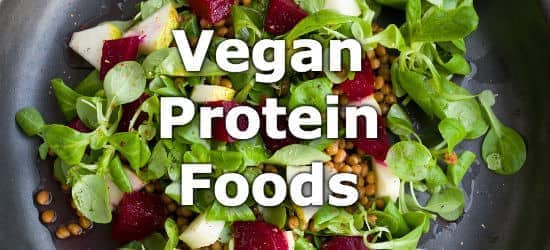 Next ➞
Next ➞
